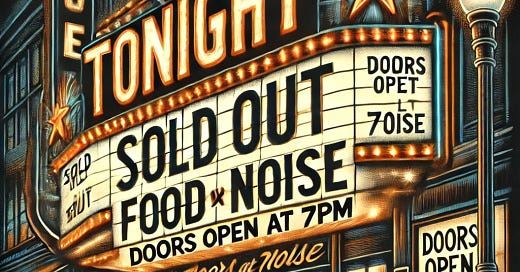I recently posted a video on TikTok about people's constant talk about food noise. I hear it over and over, especially from many folks taking GLP-1s for weight loss, that finally, these meds are quieting the "food noise"—those persistent thoughts about food that people struggle with. In the video, I offered some thoughts on why what we call food noise might really be hunger. And hunger is not something we need to be afraid of.
And, well, TikTok had thoughts about that.
Because it’s TikTok, I got some comments that were, let’s say, strongly worded.
Most of the comments I received pushed back, saying that the food noise they experienced was not hunger at all, but rather cravings that felt uncontrollable—like an impulse that couldn’t be ignored. They shared how these meds had finally reduced their cravings and brought them a sense of peace. And honestly, I get that. When food thoughts feel overwhelming, they can be confusing, cause anxiety, and ultimately make us feel like something is wrong with us for having those thoughts in the first place.
But I think there’s something deeper at play here.
Food noise isn’t just about the food itself. It’s about our relationship with food, the restrictions we’ve placed on ourselves, and the guilt or shame we carry around eating. Almost all of us have been taught from an early age that some foods are good and some are bad. We’ve been told that we can’t trust ourselves around food and that the only way to feel safe is to control food through rules and restrictions. If you’ve ever spent years trying to “control” your eating, those constant thoughts about food might not be about physical hunger at all—they might be about your body trying to navigate scarcity, rules, or deprivation. And the more we try to suppress them, the louder they tend to get.
I can empathize with those who commented on my post. I could feel their frustration at not being understood, and I could also feel their exhaustion from dealing with cravings.
It reminds me of the Minnesota Semi-Starvation Study conducted by Ancel Keys 80 years ago. This study examined the physical and psychological effects of semi-starvation on healthy men. Over six months, participants were put on a restricted diet, losing about 25% of their body weight. The study revealed that starvation leads to extreme physical effects—fatigue, weakness, slowed metabolism—but also severe psychological distress, including obsession with food, depression, anxiety, and social withdrawal. Even after refeeding, recovery was slow. His study highlights how restrictive dieting can profoundly impact both body and mind, offering crucial insights into eating disorders and the dangers of chronic dieting.
Aren’t most of us just real-world examples of this study? For those still deeply involved in diet culture—controlling, avoiding, and restricting food—doesn’t it make sense why they’d feel obsessed with food?
So what if, instead of fighting food noise or assuming it’s something to fix, we got curious about it? What if we asked:
Am I physically hungry right now?
Am I feeling deprived in some way?
What am I actually craving—food or something else?
How long have I been living by my own food rules?
Because when we start to explore food noise instead of fearing it, we can begin to rebuild trust in our bodies. And maybe then, food noise won’t feel so loud—or so out of control.
What do you think? Have you experienced food noise in this way? Drop a comment, and let’s talk about it.
Note: I want to be very clear about GLP-1s. I have no judgment or issue with people taking them. There are so many reasons why someone might choose to use these medications, and there is a lot of nuance and discussion to be had about them. Maybe I’ll dive into that in next week’s post—so stay tuned.




I am that person for whom food noise has always felt compulsive and ever present, yet I am also that person for whom food noise has been greatly softened by avoiding deprivation. Good post!